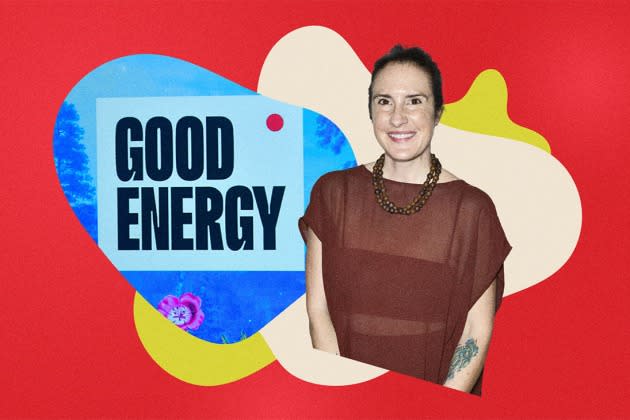Good Energy Expands to Incorporate Sustainability Consulting and Workshops

This story is part of The Hollywood Reporter’s 2023 Sustainability Issue (click here to read more).
Since Anna Jane Joyner started Good Energy, an open-source playbook for increasing narrative portrayals of climate change in scripts, in April 2022, the project has expanded beyond a document for screenwriters into a broader resource for climate conversations and consulting. The founder estimates more than 150,000 visits to the site to download the playbook since it first launched, and the Good Energy team continues to work with many of the major networks and streamers to distribute it.
More from The Hollywood Reporter
Hollywood Courts Wall Street's ESG Investors Mainly With Film and TV Messages, Not Carbon Offsets
'A Matter of Degrees' Co-Host: Hollywood Needs More Climate Stories
Internally, in terms of the playbook’s digital technology, it has gotten an update to “make the user journey more simple,” Joyner says. And with regard to the content itself, other clarifying changes have been made as well.
“We actually moved away from using the language ‘climate story’ and ‘climate storytelling,’ primarily because we were finding in our qualitative research that writers and other people in the industry were interpreting that to mean that we were asking them to write some sort of new kind of story, or a new kind of genre,” Joyner explains. “So really reframing it to emphasize that we’re not talking about a new kind of story, we’re just really talking about acknowledging climate in any story that’s taking place here on this Earth now or in the future. It’s not about a new subject matter or a different kind of story. It’s really just about writing what it feels like to be alive right now.”
In October 2022, the team behind the playbook started rolling out a workshop program, which brings writers, creative executives and other members of the entertainment industry together to talk about the best practices for approaching stories that incorporate climate change visibility. Currently, they offer workshops across different genres: true crime, children’s programming and a forthcoming session on comedy. Later this year, Joyner says they plan to add another workshop to their roster; created in collaboration with the Center for Cultural Power, this offering will explore the connection between “climate change and racial justice,” she says, “and how it affects stories.”
When Good Energy launched a research project with the USC Norman Lear Center last fall, the mission was to provide “more specific data on the frequency of climate in scripted entertainment, and also some audience survey research,” Joyner says. These findings explored how often themes like climate-related disasters and fossil fuels were mentioned and accurately described; for instance; between 2015 and 2020, only 2.8 percent of scripted television acknowledged climate change or any of the other climate change-related keywords that were studied.
“I thought it was really fascinating — and kind of affirmed the research — that when we asked participants if they recalled hearing about climate in any of the scripted television and film [they watched], the overwhelming response was, ‘No, I can’t think of anything.’ The two [projects] that really came to the forefront were Day After Tomorrow, which is almost 20 years old, and 2012, which is an apocalypse film that has nothing to do with climate change,” Joyner says. “It’s very clear that audiences are still not experiencing it.”
The research also revealed that American audiences consistently said that they didn’t see their level of concern about climate change reflected back to them by characters onscreen.
Says Joyner: “We have to be talking about this both in our real life and in our stories because if we don’t, we’re really perpetuating a dangerous false sense of normalcy — which is not good for our climate, but it’s also not good for our stories, because it’s a disconnect between the audience and the characters in the world of your story.”
The Good Energy team has also expanded into the realm of consulting, with a program that advises entertainment industry clients on best practices to incorporate more climate narratives into their projects, drawing on the research and data the team has collected thus far.
Next, Good Energy will reteam with the USC’s Norman Lear Center to do more research on climate in entertainment, specifically focusing on material from 2021 and 2022. The goal is to find ways to “move forward beyond the 2.8 percent and actually get some hard data on it,” Joyner says. “Not only looking at the frequency [of climate references] and how audiences feel about it, but also what sort of impact it’s having on audiences’ perceptions, beliefs, emotional experiences and also propensity to take action.”
Fortunately, some TV shows are doing climate storytelling right. Joyner lists Apple TV+’s Extrapolations and ABC’s Abbott Elementary as two examples that are acknowledging climate change in an artful, sometimes humorous way.
“My hope is to do more of a narrative analysis this year, so we’re not just looking at the frequency but we’re also looking at how the stories are actually showing up,” Joyner says. “I’d love to do more academic research into the narrative.”
Read about how HBO Green, Sony Pictures and Amazon Studios are making sustainability the default.
Best of The Hollywood Reporter
